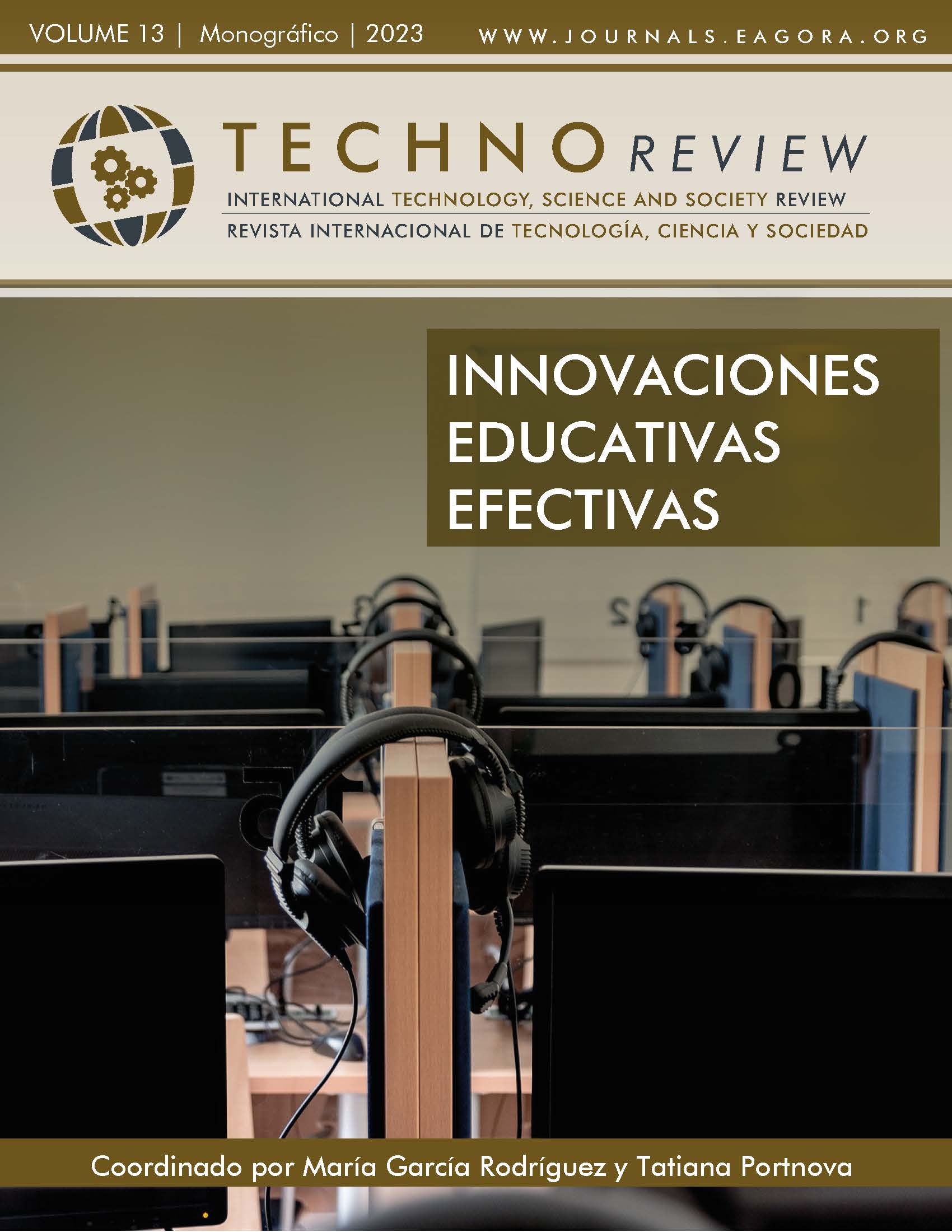Interactive video in higher education
Edpuzzle as a tool for teaching Economic History
DOI:
https://doi.org/10.37467/revtechno.v13.4786Keywords:
Competence assessment, Economic History, Higher Education, Interactive video, Mobile learning, Multidisciplinary innovation, Teaching experienceAbstract
The irruption of ICT in university education has allowed the development of mobile learning. In this context, the authors of this paper analyse how the use of interactive video tools is a useful instrument in Higher Education and in the assessment of competences. For this purpose, they use the video editing tool Edpuzzle in some of the practice groups of the Economic History course of the Degree in Business Administration and Management at the University of Jaén. The teaching innovation experience has been carried out during the first four-month period of the academic year 2021-2022.
References
Agreda-Montoro, M., Rodríguez-García, A. M. y Alonso García, S. (2018). Aplicaciones TIC para la innovación metodológica docente en educación superior. Trances, 10(6), 691-702.
Aguilera-Hermida, A. P., Quiroga-Garza, A., Gómez-Mendoza, S., Del Río Villanueva, C. A., Avolio Alecchi, B. y Avci, D. (2021). Comparison of students’ use and acceptance of emergency online learning due to COVID-19 in the USA, Mexico, Peru, and Turkey. Education and Information Technologies, 26, 6.823-6.845. http://doi.org/10.1007/s10639-021-10473-8
Castro-Valdivia, M. (2016). La investigación histórica a través de la TIC: una experiencia docente. En M. A. Bringas, E. Catalán, C. Trueba y L. Remuzgo (Eds.), Nuevas perspectivas en la investigación docente en la Historia económica (pp. 54-61). Universidad de Cantabria.
Castro-Valdivia, M., Larrinaga-Rodríguez, C. y Matés-Barco, J. M. (2019). La enseñanza de la historia de la empresa en la era digital. En A. R. Fernández Paradas, M. Fernández-Paradas, L. B. Tobar Pesántez y R. Ravina Ripoll (Eds.), Educación y felicidad en las ciencias sociales y humanidades. Un enfoque holístico para el desarrollo de la creatividad en la era digital (pp. 469-488). Tirant Lo Blanch.
Castro-Valdivia, M., Larrinaga-Rodríguez, C. y Vázquez-Fariñas, M. (2019). La enseñanza de la historia económica y las TIC. Retos y oportunidades. En A. R. Fernández Paradas, M. Fernández-Paradas, R. Ravina Ripoll y L. B. Tobar Pesántez (Eds.), Humanidades y Ciencias Sociales. Interrelaciones con las nuevas tecnologías y la sociedad del conocimiento (pp. 251-262). Narcea.
Castro-Valdivia, M. y Vázquez-Fariñas, M. (2021). Innovación docente aplicada a la enseñanza de la historia económica: flipped classroom y mobile learning como alternativas a la metodología tradicional. En A. J. Pinto Tortosa y J. A. Soto Pineda (Coords.), Challenge Based Learning: Un puente metodológico entre la Educación Superior y el mundo profesional (pp. 73-94). Thomson Reuters Aranzadi.
Castro-Valdivia, M., Vázquez-Fariñas, M. y Villar-Chamorro, F. (2021). El mobile learning: aplicaciones para la docencia virtual. En A. R. Fernández Paradas, M. Fernández-Paradas y R. Ravina Ripoll (Eds.), La Glocalización patrimonial como vehículo para la construcción de las identidades (pp. 357-376). Tirant lo Blanch.
Cesare, D. M. D., Kaczorowski, T. & Hashey, A. (2021). A Piece of the (Ed)Puzzle: Using the Edpuzzle Interactive Video Platform to Facilitate Explicit Instruction. Journal of Special Education Technology, 36(2), 77–83. https://doi.org/10.1177/0162643421994266 Hernández, R. M. (2017). Impacto de las TIC en la educación: Retos y Perspectivas. Propósitos y Representaciones, 5(1), 325-347. https://doi.org/10.20511/pyr2017.v5n1.149
Díaz Álvarez, A. y Pons Fanals, E. (2011). La adaptación del sistema universitario español a las nuevas demandas sociales: desde los objetivos a las reformas. Revista d’Innovació Docent Universitària, 3, 86-98.
Hernández, R. M. (2017). Impacto de las TIC en la educación: Retos y Perspectivas. Propósitos y Representaciones, 5(1), 325-347. https://doi.org/10.20511/pyr2017.v5n1.149
Hinck, A. & Tighe, J. (2020). From the other side of the desk: students’ discourses of teaching and learning. Communication Education, 69(1), 1-18. https://doi.org/10.1080/03634523.2019.1657157
Miralles Martínez, P., Gómez Carrasco, C. J. y Monteagudo Fernández, J. (2019). Percepciones sobre el uso de recursos TIC y «mass-media» para la enseñanza de la historia. Un estudio comparativo en futuros docentes de España-Inglaterra. Educación XX1, 22(2), 187-211. https://doi.org/10.5944/educXX1.21377
Mosquera Gende, I. (2022). Flexibilizar el proceso de enseñanza y aprendizaje en una universidad online. Edutec. Revista Electrónica De Tecnología Educativa, (79), 199-213. https://doi.org/10.21556/edutec.2022.79.2351
Pérez-Gutiérrez, M., y Cobo-Corrales, C. (2019). Evaluación formativa y compartida a través del mobile learning en el Grado en Magisterio en Educación Primaria en la Universidad de Cantabria. Revista Infancia, Educación Y Aprendizaje, 5(2), 48–53. https://doi.org/10.22370/ieya.2019.5.2.1501
Pulukuri, S. & Abrams, B. (2020). Incorporating an Online Interactive Video Platform to Optimize Active Learning and Improve Student Accountability through Educational Videos. Journal of Chemical Education, 97(12), pp. 4505-4514. https://doi.org/10.1021/acs.jchemed.0c00855
Shelby, S. J. & Fralish, Z. D. (2021). Using Edpuzzle to improve student experience and performance in the biochemistry laboratory. Biochemistry and Molecular Biology Education, 49(4), pp. 529-534. https://doi.org/10.1002/bmb.21494
Vázquez-Fariñas, M. (2021). La enseñanza de la Historia Económica en un contexto de pandemia: una experiencia docente en la Universidad de Jaén. En M. M. Molero Jurado, Á. Martos Martínez, A. B. Barragán Martín, J. J. Gázquez Linares, M. C. Pérez-Fuentes y M. M. Simón Márquez (Comps.), Innovación Docente e Investigación en Ciencias Sociales, Económicas, y Jurídicas: Nuevos enfoques en la metodología docente (pp. 645-656). Dykinson. https://doi.org/10.2307/j.ctv2gz3wp2.61
Vidal Prado, C. (2012). El Espacio Europeo de Educación Superior y su implantación en las universidades españolas. Revista catalana de dret públic, (44), 253-283.
Downloads
Published
How to Cite
Issue
Section
License
Those authors who publish in this journal accept the following terms:
- Authors will keep the moral right of the work and they will transfer the commercial rights.
- After 1 year from publication, the work shall thereafter be open access online on our website, but will retain copyright.
- In the event that the authors wish to assign an Creative Commons (CC) license, they may request it by writing to publishing@eagora.org







